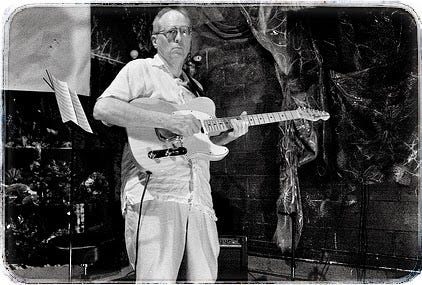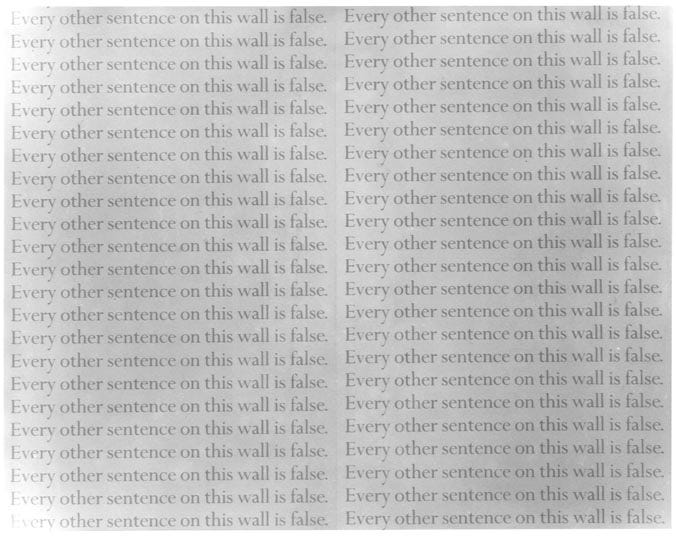An interview with Henry Flynt
Anti-art, math art, Jorge Pardo & Lilly Reich.
1
Rafael Delacruz made a beautiful video for my song, The Well.
2
I interviewed the artist, Jorge Pardo a few years ago for a column I wrote in Art in America, asking him for recommendations. I’ll be posting these recommendation columns in each of my substacks for the next few months.
3
Henry Flynt is a philosopher, musician and artist who began working in the post-John Cage milieu of New York in the early 1960s. He protested against high art institutions in the name of ‘anti-art,’ and founded ‘concept art’ (not ‘conceptual art’), a marriage of mathematics and aesthetics. As a musician, in the 1960s he played in the band The Insurrections with artist Walter De Maria (on drums), and has since gone on to pursue a strain of music that draws upon bluegrass, blues, and minimalism. Over his long career, he has released many albums and published philosophical writings that connect his multifarious disciplines, often inventing highly esoteric terminologies for his hily pragmatic ideas.
– Ross Simonini
Ross Simonini: Early on, you studied mathematics. How did you arrive at art?
Henry Flynt: When I was young, I espoused what they would have called a philosophy of science - logical positivism - and I kept pushing it and pushing it, and I finally realized that logical positivism is nothing but admiration for science. It's a glorification of science. Rudolf Carnap, for instance, was a physicist, who switched to philosophy and the only thing that he knew to do, was to glorify his previous profession. He said there isn't any such thing as right mathematics, and he was saying that he was still totally committed to mathematics as it was, but he also thought that by saying this he was modernizing the excuse for mathematics. I mean if you go back far enough, they would say that a statement like 2 + 2 = 4 is true because it describes an immaterial, invisible world. This is the sort of thing that I absorbed when I went to college for the first time. I thought and thought about this until I realized that Carnap was simply overlooking extremely obvious objections to science. He would never make them, because he didn't want to.
RS: What would be an extremely obvious objection?
HF: Suppose that you have a neuroscientist who says that your mental processes are nothing more than how your brain is wired – that's it! So in other words, all of what you call your thinking is simply the mechanical operation of a machine in your head called the brain. The problem is that in order to talk about that, neuroscientists use logic. And they use mathematics. And they cannot simply say that the logic and the mathematics are how your brain is wired. It would be some kind of preposterous circular reasoning. Logic and mathematics have to be credible to us. We have to appreciate them in consciousness. And as it turns out, when you analyze logic and mathematics they quickly fall to pieces. In other words mathematics is really just one big walking contradiction.
RS: How so?
HF: Like going back to a very obvious example: when they discovered that a square root two is an irrational number. That was an unmitigated disaster for mathematics! There wasn't any such thing as an irrational number. That is our term. They didn't have that term. These irrational numbers had not been promoted to the status of a number. So the mathematicians were already in contradiction with their axiom that the result of an arithmetical calculation has to be a number. Because they had an arithmetical calculation that had a result that was not a number by their standards. So in other words, at that particular moment in time, the system blew up. I mean, the reason why I'm going into such detail about this is because every single thing that ever happened in mathematics works the way that this works. They go along, they hit something that blows up in their face, they're presented with a contradiction, and what they do is say, uh, well, we changed our minds! It's not a contradiction! We just decide that maybe it's not a contradiction, it's just… it's just new. Irrational numbers are just something new! And so they have been trying to explain irrational numbers ever since.
RS: Since when?
HF: Since about 2300 years ago, and they still have not perfected their explanation of the irrational number. They have a story that they tell and it depends on what level you take mathematics. They have one story that they might tell you in high school, and another story for college, and another story for the graduate seminar, and then they finally take you in the back room and tell you that they don't know what the real answer is.
RS: But is that surprising? Isn't that just part of discovery and experimentation?
HF: Well, there are very few legitimate mathematicians who would say what I have been saying here. You could say I'm a pragmatist and you could say that, if irrational numbers are useful then let us have them, you know, whether we can explain them or not. Maybe they all believe that. But they don't talk like that. Pi as 22/7ths is much more convenient than what it actually is. It's a transcendental number, and who wants to learn the theory of transcendental numbers? I mean 22/7ths – that was fine for a lot of people for a long time. But once you get into very high-end technological applications and you use 22/7ths, the power plant will blow up on you.
Normally people in this field of endeavour are not that kind of cash-value pragmatist. They take themselves more seriously. And so, now we go back to the neuroscientist, who says that it's all hardwired into your brain, well what is? What is it that is hardwired in your brain? I mean, is it 22/7ths? Is it the number system that only has rational numbers in it? Or is it this game of saying it's a contradiction; no, it's not a contradiction. I'm telling you, that is everywhere in mathematics. Every important result comes about like that.
RS: Do you propose an alternative to this approach?
HF: I mean, I did propose a vast project which was going to draw the necessary conclusions from all that I've said. That's called meta-technology. The idea of meta-technology is that a scientist manipulates matter. What people use to think of as determinations of reality – mathematics and logic – would come somewhere underneath that rubric. Meta-technology takes the determination of reality as the subject matter, if you will, and its goal is to manipulate that. The first time that I explained this to somebody, he said to me, what you're talking about is transfer of technology at the level of belief systems. But more strictly it should be manipulation of the determination of reality. That means, for example, that I'm going to go to this mathematician, who has his nice game going, and I'm going to reach into his game and I'm going to blow it up. I'm going to make it go somewhere that he doesn't want. In other words like this is going to be my role in the situation. By all rights this should lead to a much more powerful technology, not a weaker one.
RS: The whole binary system of true and false seems to dictate a lot of what you've been saying, and the same is true of concept art.
HF: I even have a term for it – binary decidability. In the scientific world there's no such thing as stepping outside that. We need that in order to maintain clarity.
RS: Would you say you're trying to subvert that through art?
HF: I'm trying to wreck the true/false game, in philosophy and in meta-technology. In this civilization, there is an assigned role for the artist as an irrationalist, as having an infantile mind, an irrational mind, and so forth. Aimé Césaire, the Caribbean poet said, I know that 2 + 2 = 5. But I have nothing to do with that. He was a surrealist. You have Antonin Artaud, you have these surrealists and they were expected to sort of run around, misbehave, say ridiculous things, but the guy who is running the nuclear power plant can't afford to think that way. (Except that in the real world they do think that way and that's why these plants are always blowing up.) So I want to discourage the idea that I'm off in some irrational territory just because that's where artists live, because they're just these pitiful people who chop off their ears. I would be delighted to match the level of the physicists and the mathematicians and debate them on their own territory. I don't need an oil painting.
RS: Can you talk about how you developed concept art?
HF: The actual line of development was very specific. At the same time that I was coming out of all this logical positivism in my late teens, I'd taken a lot of music lessons and had basically never taken an art lesson. In music there was this fetishism of structure and I subscribed to so-called formalism in mathematics, which just says that mathematics is a game – and I took that very seriously. I arrived at this extremely negative view of cognition, which I later called cognitive nihilism or belieflessness, and I was looking at these proofs and I was looking at the music people and at all of these increasingly elaborate structures and the idea came to me: why can't you have a kind of mathematics in which the notation is going to interact with the subjectivity of the viewer?
RS: Would that even be mathematics?
HF: Right, in mathematics that is the biggest no-no. The first time that I presented it, actually to a mathematician at New York University he just ushered me right out of his office! [Laughs].
RS: So it's more about aesthetics?
HF: I was saying, why don't I construct these so-called proof trees as aesthetic objects, since we no longer believe that mathematics is true or false. It's a game. So I'm going to create some kind of interesting game that involves the viewer's relationship to the notation. And that will issue in what would technically be called derivations from premises. And that's how I announced concept art in June of 1961. I was already in the avant-garde of the avant-garde of the avant-garde. But this was something completely new. Concept art was apropos of nothing, and now I know why. Because I pictured it originally as being a species of art. Its value is aesthetic. But it's very important to understand that there's a long tradition in mathematics of the aesthetic value of pure mathematics. How does a mathematician defend pure mathematics? Does he defend it by saying that it's true? Or does he defend it by saying that it has superior aesthetic quality?
RS: Does pure theory have aesthetic value?
HF: That's what mathematicians say. In other words, there's a textual tradition of saying that. But I challenge these guys to start from zero and to defend everything that they're saying. Karl Menger [mathematician] said that the value of pure mathematics is aesthetic. He said that we should no more be required to defend what we do than Beethoven should be required to defend a sonata. But then the punchline is always this: and, if you don't go along with us, then we'll make an atomic bomb and drop it on you. Because you can also use this stuff to kill people! I mean Mathematics 101 is really Military Science 101. Conventional mathematics takes notation for granted. It's a mark on the paper, the mark stays there, behaves itself, you don't have to worry about it. My notations sort of jump out at you and attack your eye, so to speak. This is where concept art started.
I think it was Allan Kaprow who already said in the ‘50s that people will no longer be painters, poets, there will just be artists. It's all the same thing. If I may say so I think that I was actually outside of that – the so-called modes of expression, the so-called seven modes of expression that make up the fine arts; music, painting, sculpture, drama, etc. I began to do what I called activities. And that was not any of these things, it was something else. I had everything going at the same time. The concept art was in a box by itself, but the other things that I was doing were on some kind of recognizable continuum with what we in the self-described extreme avant-garde were doing.
RS: Who's we?
HF: The first people that I mention are musicians. Cage, La Monte Young, etc. Why wouldn't it have been Jackson Pollock? Because he didn't have any structure. He wasn't going into this with some kind of quantitative infrastructure. But I mean, certainly La Monte would have claimed that he was post-Cage. I would have.
RS: What do you mean by ‘beyond’?
HF: It's a race!
RS: Do you feel that art is a race?
HF: Which horse is out in front? Well, that's what we were supposed to believe in 1960. The new, the new, the new, the new, the new
.











